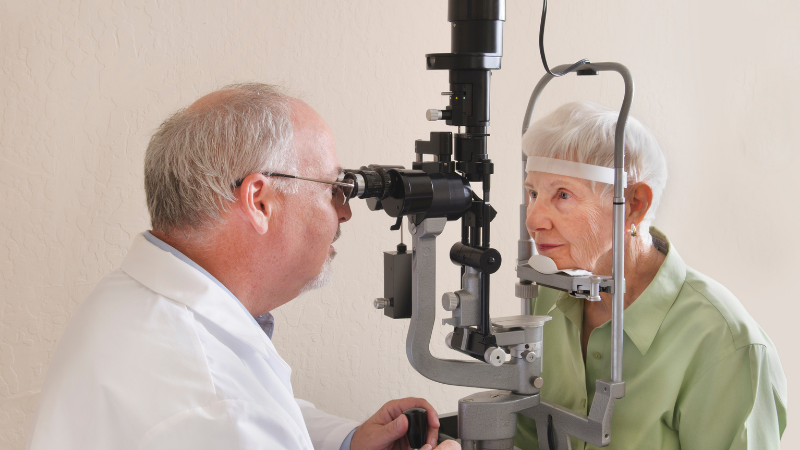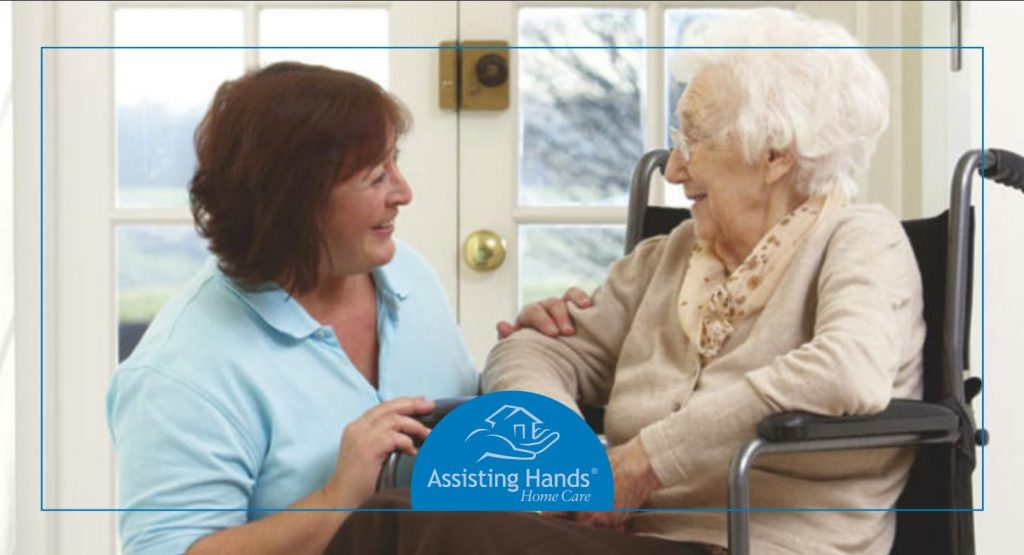
Just as the body ages, the eyes also undergo the aging process. Eye problems begin to appear in people in their early to mid-40s. Plus, certain diseases can affect eye health. As individuals grow older, they may experience some of the following common eye problems.
How does vision change with age?
People younger than 40 have a flexible natural eye lens, which allows them to focus on objects nearby or far away. As individuals age, however, this flexibility is gradually lost. Over time, seniors are no longer able to clearly see up-close objects or those in low light.
In addition to natural bodily processes, diseases can affect vision and eye health. Seniors with diabetes are at risk for developing retinopathy. Diabetes is a leading cause of blindness. The eye’s blood pressure and nerves can be damaged by high blood pressure and result in permanent vision loss.
Age-related vision changes vary from senior to senior. Some common age-related eye issues include a need for more light, difficulty reading printed materials up close, issues with glare, changes in color perception, and the production of fewer tears by the tear glands.
- Cataracts
The lens of the eye is normally clear. A senior with cloudiness in front of the eyes has developed cataracts. Blurry vision results when the cataracts prevent light from passing through the lens to the retina. Cataracts develop slowly, oftentimes without pain or redness.
When cataracts remain small, they have little impact on vision. However, when cataracts grow thick and large, they will significantly affect vision. Large cataracts can be surgically removed. The surgery involves removing the clouded lens and replacing it with a plastic one, thereby restoring normal sight.
- Diabetic Retinopathy
Older people who experience certain symptoms may develop serious eye problems. Fluctuating changes in how clearly a senior sees may be indicative of diabetes or high blood pressure. Tiny blood vessels in the retina are damaged by these chronic conditions and can lead to vision loss.
Diabetic retinopathy can cause either blurred vision or no symptoms at all. This complication develops in seniors with diabetes when blood vessels leak fluid. Vision loss or serious blindness can occur when new blood vessels grow and bleed into the center of the eye.
- Floaters
Occasionally seeing floaters is a normal part of aging. However, when a senior sees more floaters than usual and they are accompanied by bright flashes of light, it could mean a tear has developed in the retina and it may detach. Immediate medical treatment is necessary to prevent vision loss.
- Glaucoma
Eye health symptoms, such as losing peripheral vision, can be a sign of glaucoma. This eye disease develops when the optic nerve becomes damaged and is no longer able to send full visual images to the brain. Early symptoms do not appear until the eye damage has already started.
Glaucoma most frequently affects people over the age of 60, as the eye’s nerve deteriorates over time. Increased pressure in the eye occurs in seniors who develop glaucoma. Decreasing this pressure can be achieved with eye drops or surgery. Age, diabetes, and medication are risk factors for glaucoma.
- Age-Related Macular Degeneration
Age-related macular degeneration (AMD) affects the macula, which is a part of the retina that contains millions of light-sensitive nerve cells. Blurred or distorted vision can result when cells are lost in this area. AMD does not cause total blindness but can lead to some vision loss.
People over the age of 60 are most likely to experience AMD. Wet AMD occurs when new blood vessels grow in the eye and leak. Dry AMD develops more slowly; while it does not have a specific treatment, its progression can be slowed with vitamins and minerals.
- Corneal Disease
Watery eyes, redness, pain, and reduced vision are symptoms of corneal diseases. The cornea, a clear, dome-shaped area at the front of the eye, helps focus light that enters through the eye. Some diseases can damage the cornea and require treatment, such as medicated eye drops or surgery.
- Temporal Arteritis
Elderly women are a segment of the population that are most often diagnosed with temporal arteritis. This eye disease causes arteries located in the temple areas of the forehead to become inflamed. Severe headache and pain when chewing can precede sudden and permanent vision loss.
The eyes require care like the rest of the body, so seniors are encouraged to practice self-care. Protecting eye health includes eating a balanced diet and not smoking. Schedule an eye exam once a year and visit a physician to check for diseases that could potentially affect eye health.

Seniors who develop eye problems may require extra support at home. The professional caregivers from Assisting Hands Home Care are experienced in all aspects of non-medical home health care and will ensure your aging loved one experiences a high quality of life from the comfort of home.
When our elderly care recipients are scheduled for their annual eye exam, for instance, we provide safe transportation to the ophthalmologist’s office. If medications are prescribed, our caregivers give timely medication reminders to ensure the senior remains compliant with the drug regimen.
Whether your elderly loved one requires 24-hour care, live-in care, or short-term care, Assisting Hands Home Care gives families flexible and dependable scheduling options. Multiple caregivers may be scheduled for 24-hour care services, ensuring the senior has around-the-clock professional attention.
Two caregivers rotate 3- to 4-day shifts with our live-in care option. This type of care gives the senior complete support from early morning and throughout the day and night. Our overnight caregivers are also trained to respond quickly and appropriately to emergencies.
Whether the senior in your life would benefit from 24-hour care or live-in care, trust Assisting Hands Home Care, like so many families in Medinah, Glendale Heights, Itasca, Bensenville, Elmhurst, Villa Park, Addison, Lombard, IL and the surrounding communities have. Schedule a consultation with us and give your elderly loved one compassionate in-home support.















